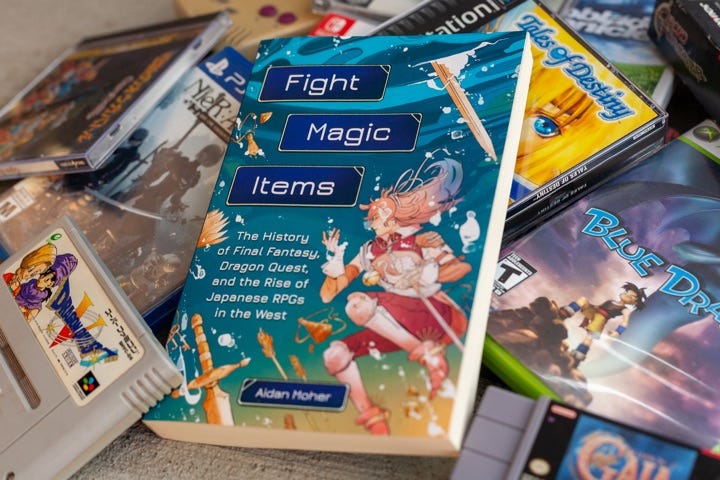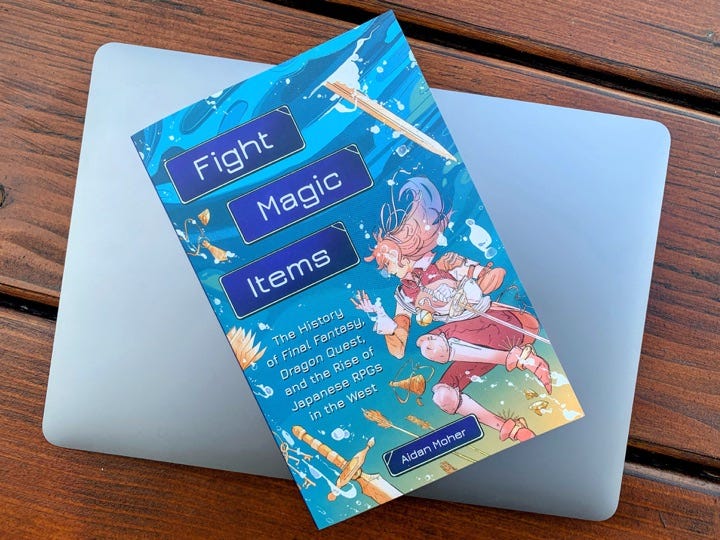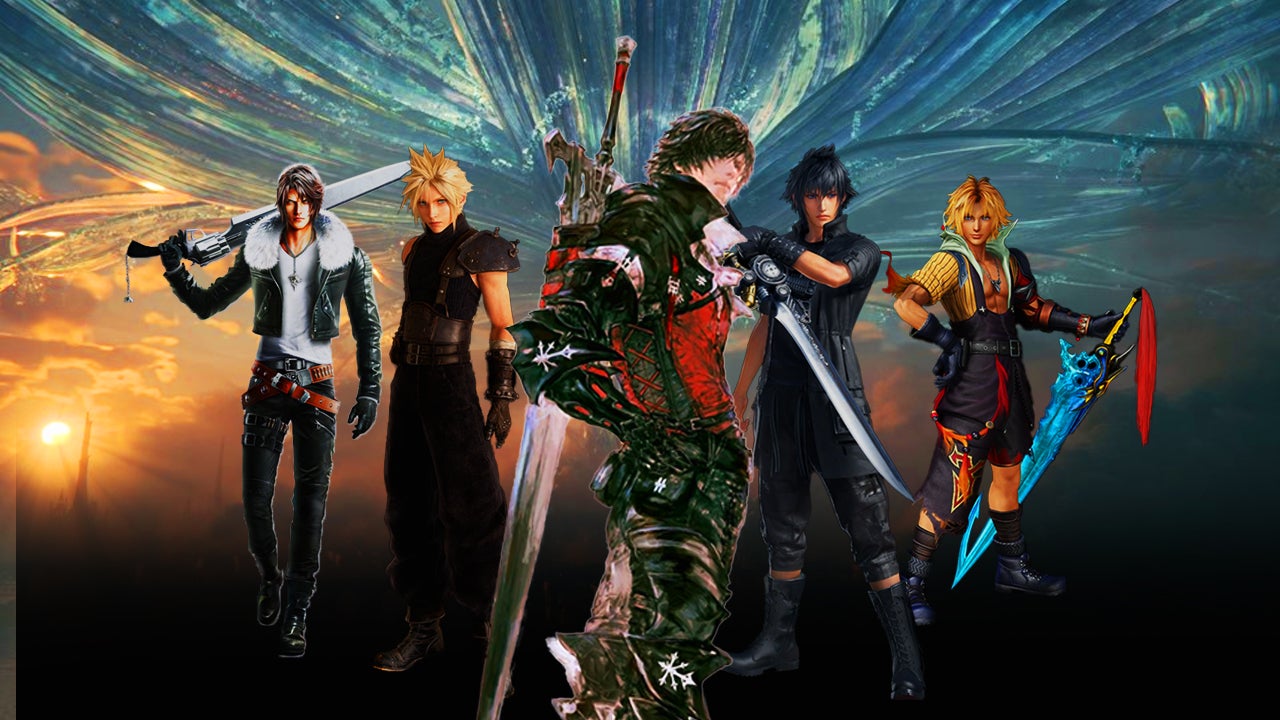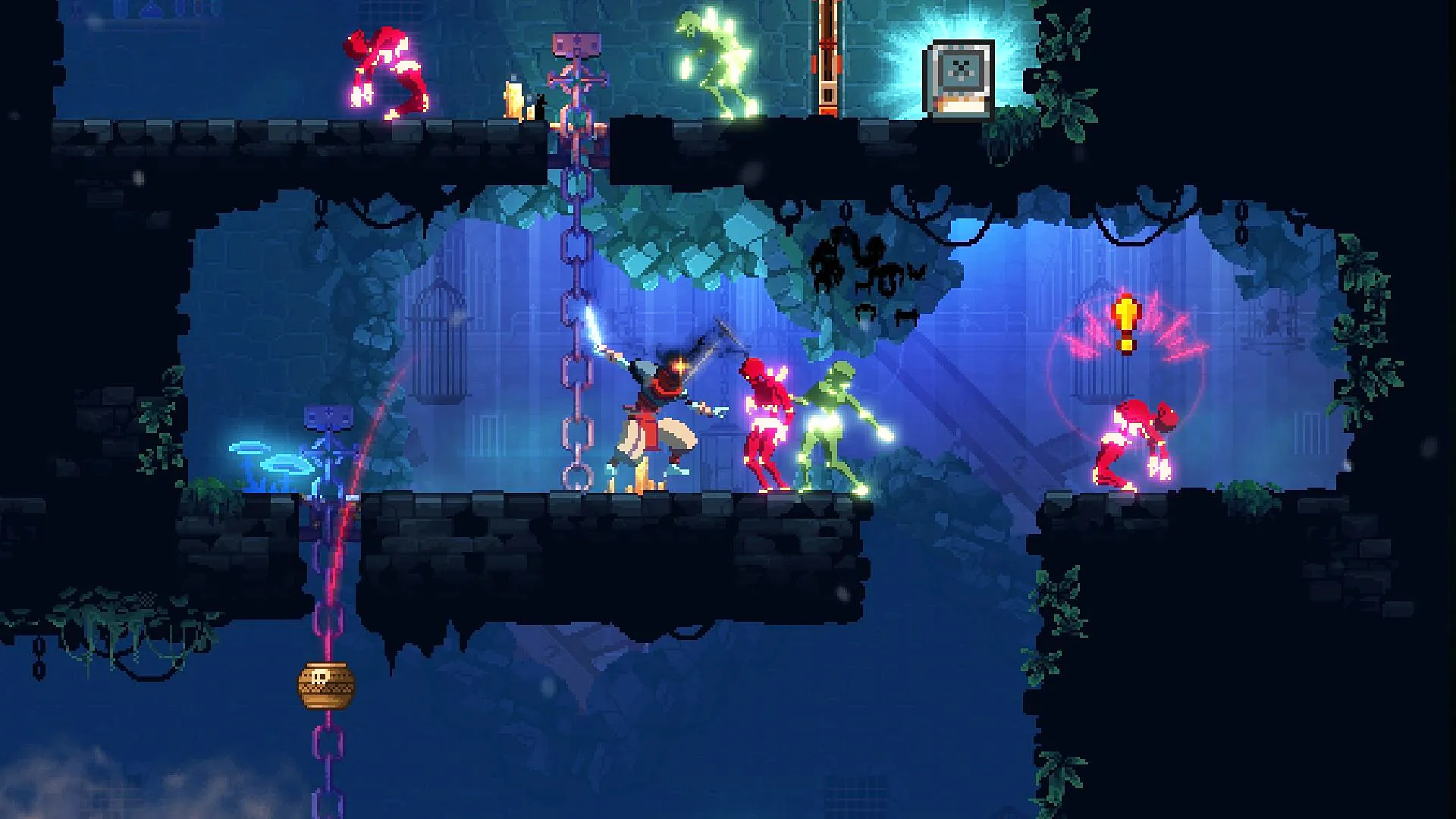Fight, Magic, Items promo round-up!
Fight, Magic, Items is over a month old, y’all! How’d that happen? What is time? I’ve been so pleased, proud, and humbled by the overwhelmingly positive response the book’s gotten from JRPG fans everywhere—but that doesn’t mean the fun’s over. I’ve been grinding away promoting the book and thought it’d be useful to gather all my appearances together for you somewhere other than a Twitter1 thread.
If you’re interested in covering Fight, Magic, Items, please reach out! Contact info can be found on my website.
If you haven’t yet, please consider grabbing a copy of Fight, Magic, Items from your favourite book retailer, leaving a rating on Amazon, or checking out its official website for more info.
For all the latest news on Fight, Magic, Items, make sure you smash that Subscribe button like it’s the weak point on a crab boss.

Excerpts
Engadget: “Hitting the Books: How Pokemon took over the world”
With the imminent release of Pokemon Scarlet and Pokemon Violet—the latest entries in the long-running and much-beloved series—Engadget kindly ran an excerpt from Fight, Magic, Items that explores Pokemon’s buggy (the creepy crawly kinda AND the computer kind) origins, unlikely success in the west, and ongoing impact on gaming and pop culture.
Before it was about catching monsters, however, Pocket Monsters was conceptualized by its insect-obsessed creator, Satoshi Tajiri, as a bug-catching simulator. Known to his classmates as “Mr. Bug,” Tajiri spent his childhood dreaming of becoming an entomologist and studying bugs for a living . . . that is until he discovered arcade games like Space Invaders. Though his professional ambitions shifted focus to bits, bytes, and programming scripts, his love for bug collecting remained, and at just twenty-four years old he came up with the idea for what would eventually become Pocket Monsters.
Read “Hitting the Books: How Pokemon took over the world” on Engadget
io9: “How Final Fantasy VII Changed the Gaming Landscape Forever”
For the first decade of their life, Japanese RPGs found a small but passionate group of fans in the west, just enough to keep it on life support. And then, in 1997, thanks to Sony’s new PlayStation and the affordability of optical media, Final Fantasy VII arrived and the genre went meteoric.
In this exclusive excerpt for io9, I explore the legendary game’s risky beginnings, ascendant success, and long legacy.
There are moments in a person’s life when they know with certainty that things have changed and a new era has begun. That they’re taking a step forward in history. Drenched in the glow of a CRT, a group of friends explored the slums of Midgar and knew, with absolute certainty, that things would never be the same again. That night lasted forever and was over in the blink of an eye. When they stepped out into daylight the next morning, Midgar’s Sector 7 was burning at their backs, and they set forth into a new era of JRPGs.
Such was the impact of Square’s Final Fantasy VII. It changed not just the kids in my friend’s basement, but the entire genre its predecessors had helped establish a decade and a half earlier, crossing the threshold of a new era of JRPGs without looking back.
Read “How Final Fantasy VII Changed the Gaming Landscape Forever” on io9
Podcasts
Everybody’s Talking at Once: “Root and Branch, with Aidan Moher”
Aidan Moher is probably best known for his long-running, Hugo-winning blog A Dribble of Ink and its spiritual successor Astrolabe, or else for his short-form fiction, which prods at the boundaries of various sci-fi and fantasy subgenres. Today, he releases his first non-fiction book, FIGHT, MAGIC, ITEMS: The History of Final Fantasy, Dragon Quest, and the Rise of Japanese RPGs in the West—and he stops by to attune to our aetheryte and have a chat.
Listen to “Root and Branch, with Aidan Moher”
Retrograde Amnesia: “A Chat with Aidan Moher, author of Fight, Magic, Items”
In this special episode, we sit down and chat with Aidan Moher on his upcoming book, Fight, Magic, Items: The History of Final Fantasy, Dragon Quest, and the Rise of Japanese RPGs in the West. We talk about the writing process, the history of the JRPG genre, and the pioneers and innovators who created the games we love.
Listen to “A Chat with Aidan Moher, author of Fight, Magic, Items: The History of Final Fantasy, Dragon Quest, and the Rise of Japanese RPGs in the West”
RPGFan: “Random Encounter 252 – Random Book Club – Fight, Magic, Items”
Here at RPGFan, we love our JRPGs: Tales, Trials, and everything in between. But to understand where the genre came from, we need to look back almost forty years to two legendary Japanese creators: Yuji Horii (Dragon Quest) and Hironobu Sakaguchi (Final Fantasy).
In the recent JRPG history book, Fight, Magic, Items: The History of Final Fantasy, Dragon Quest, and the Rise of Japanese RPGs in the West, author Aidan Moher explores not just the origins of the genre but also how it evolved through the 20th and 21st centuries. This week, Jono and Hilary get the opportunity to interview Aidan about his new book, his own history with JRPGs, and where he thinks the video game book publishing industry will be going in the future!
Listen to “Random Encounter 252 – Random Book Club – Fight, Magic, Items”
The Thirsty Mage: “The History of JRPGs with Author Aidan Moher”
The Thirsty Mage is the pub where friends meet to have a drink and talk about their favourite new and retro RPGs. Whether specific games or RPG related topics, the pub is always open for positive discussion.
The pub talks about the history of JRPGs with Aidan Moher, author of the new books: Fight, Magic, Items
Listen to “The History of JRPGs with Author Aidan Moher”
Memory Card: “Fight, Magic, Items, Saturn”
Author Aidan Moher emerges from the mist to reveal a section of his new book that didn't make the cut.
Listen to Memory Card: “Fight, Magic, Items, Saturn”
Harcore Gaming 101: “Top 47,858 Games of All Time: Wild Arms”
Join the HG101 gang as they discuss and rank a fondly remembered Sony-published PS1 JRPG. Featuring Aidan Moher, author of the book Fight, Magic, Items: The History of Final Fantasy, Dragon Quest, and the Rise of Japanese RPGs in the West.
Listen to “Top 47,858 Games of All Time: Wild Arms”
Tales from the Trunk: “Book Tour 21: Aidan Moher – Fight, Magic, Items”
This time around, it’s my delight to welcome (finally) Hugo-winning fan writer, Aidan Moher to the show! We’re talking about his new book, Fight, Magic, Items, which just released October 4th! Aidan reads from the introduction to the book, which leads us into a deep discussion of the games that shaped our childhoods.
Bonus: This episode includes me reading the book’s entire prologue!
Listen to “Book Tour 21: Aidan Moher – Fight, Magic, Items”

Other links
Nerds of a Feather review
It’s no secret I’m a huge fan of (and very erstwhile contributor to) the Hugo Award-winning Nerds of a Feather. Reviewer Joe DelFranco goes deep in this generous review of Fight, Magic, Items.
Though my journey into the world of JRPGs is different from Moher’s, he creates an inviting umbrella that can be appreciated by all who have found comfort within this sub-genre of influential video games. As someone who doesn't find too many things nostalgic—hell, my favorite game is only from nine years ago—it was impressive to find that Moher’s words took the wheel and had me riding shotgun while I relived some of the best escapism from my youth. Even if I hadn't played the title he was discussing, I still felt a connection to the content. Moher’s appreciation and intent are infectious and well worth investing your time into. Fight, Magic, Items isn't just a history of some of the greats, but a celebration of an incredible sub-genre that has influenced people the world over.
ComicBook.com interview
ComicBook.com’s Jamie Lovett is a fellow-JRPG fan, so it was a blast connecting with him to talk about the book and the history of the genre.
Aidan Moher has literally written the book on Japanese role-playing games. The Hugo Award-winning editor and journalist, whose work has appeared at Wired and Kotaku among other outlets, has written his first book. Titled Fight, Magic, Items: The History of Final Fantasy, Dragon Quest, and the Rise of Japanese RPGs in the West, the book chronicles the ups and downs of JRPGs' presence and popularity in North America, from the genre's inception with Yuji Horii and Hironobu Sakaguchi creating Dragon Quest and Final Fantasy, respectively, to the 32-bit boom, to the work of a new generation of designers that grew up playing those 8, 16, and 32-bit classics.
Moher put a lot of personality and personal experience into Fight, Magic, Items, making it a rich, satisfying, and entertaining read. With only two weeks left until the book goes on sale to the public, ComicBook.com caught up with Moher to chat about how Fight, Magic, Items came together and what he thinks the future has in store for the JRPG genre.
Read “Fight, Magic, Items Author Aidan Moher Discusses the JRPG's Past, Present, and Future”
Guest post at Scalzi’s The Big Idea
It’s always been a bucket list goal to contribute to John Scalzi’s “The Big Idea” series, so I brought my A-game to discuss Fight, Magic, Items “big idea” to merge the recorded history of Japanese RPGs with the very real human stories of the people who made—and play—them.
There are a number of mass culture phenomena that came from Japan to the United States and western culture generally, and in Fight, Magic, Items, author Aidan Moher delves into one such phenomenon, that the casual fan might not know had sprung from there at all.
Read “The Big Idea: Aidan Moher”
One of CBC’s “40 Canadian books we can't wait to read in October”
Every Canadian author will know the absolute thrill of being included in a CBC Books round-up, so I can’t even tell you how delighted I was when Fight, Magic, Items was included in their list of October releases.
Fight, Magic, Items is a nonfiction book that explores the "geek culture" around the classic video games known as Japanese role-playing games, also known as JRPGs. It delves into the origin stories of two classic Nintendo titles, Final Fantasy and Dragon Quest, and serves as a primer for JRPGs as it looks at the evolution of the genre and why the games have endured over the years.
Read “40 Canadian books we can't wait to read in October”
“Fight, Magic, Items is a chronicle of how Japanese roleplaying games levelled up through the decades” on Capital Daily
Capital Daily is one of my favourite local publications—providing terrific in-depth reporting on news for Victoria, BC—so I jumped at the chance to talk with reporter Tim Ford about Fight, Magic, Items and the surprising Canadian connections in Japanese RPG history.
In fact, Canada, which is the world’s third-largest producer of video games after the United States and Japan, has roots in the industry that go right back to one of the most influential companies out there: Nintendo of America.
Moher highlights in his book that the founding president of Nintendo of America, Minoru Arakawa, first came to North America when he moved to Vancouver with his wife, Yoko, to invest in a condo project.
Yoko was the daughter of Hiroshi Yamauchi, the notoriously prickly third president of Nintendo, and Minoru Arakawa effectively “married into” the family business— a business Yoko detested, almost as much as she detested the North American lifestyle.
Moher writes that the family was hauled by Arakawa into a Vancouver hotel and taken to a Denny’s next door, where Yoko declared: “If this is America, I have made a big mistake.”
End Step
This is only the beginning for Fight, Magic, Items, and I look forward to keeping that promo train going with interviews, podcast appearances—and I’ve even got a handful of related freelance features in the wings. Thanks for reading!
Support
There are lots of ways to support Astrolabe and my other work. Check ‘em out!
Keep In Touch
Enjoy Astrolabe? Want more SFF and retro gaming goodies? You can find me on Twitter and my website.
Credits
Astrolabe banner photo by Shot by Cerqueira on Unsplash
Because, honestly, who knows how long that’s gonna be around and viable. ↩





Member discussion